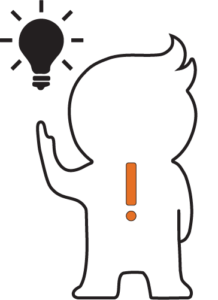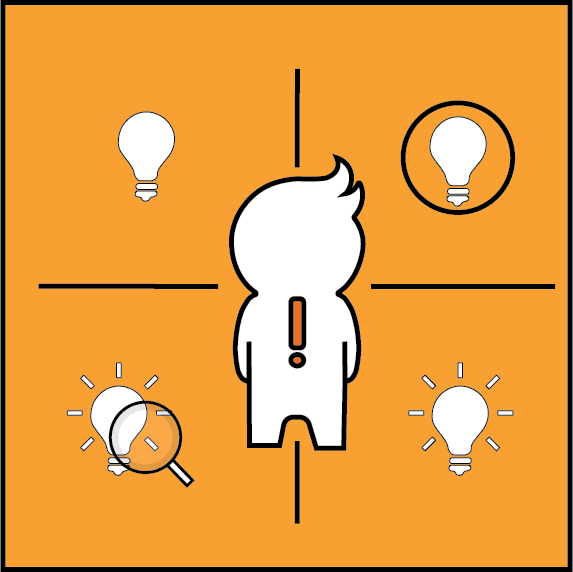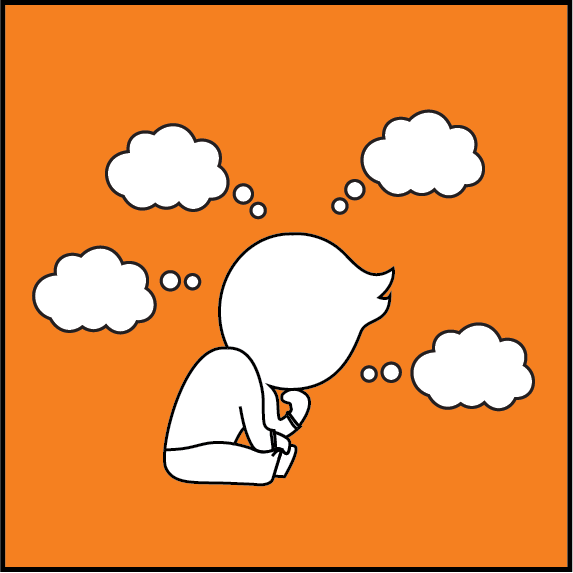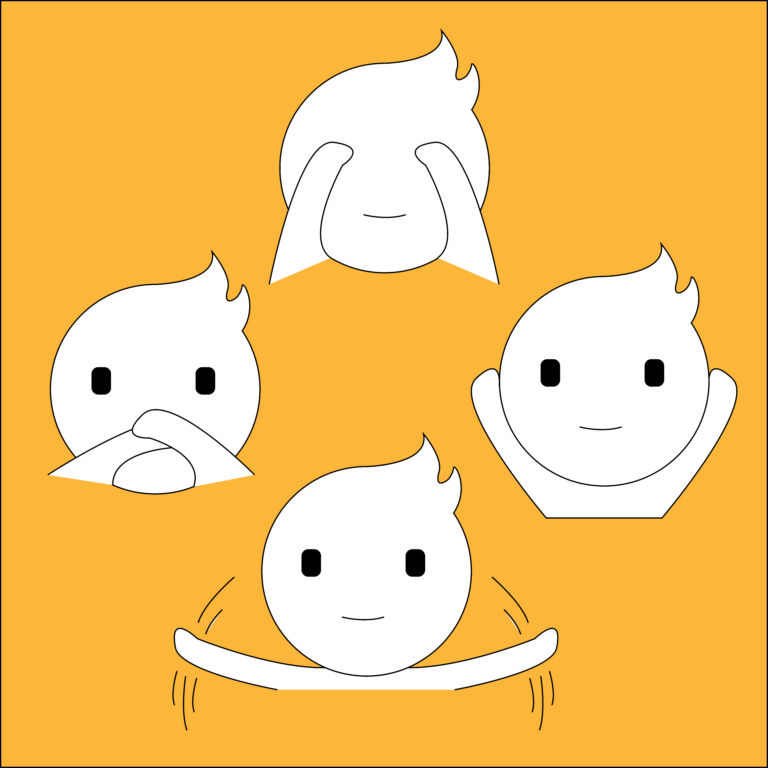6 essential skills to develop your creativity

Written by Anderson V.
April 1st, 2020

Being creative is definitely cool, but it is also hard to keep track of our performance if we do not know how to organize the information in our head properly.
We are constantly being bombarded with tons of daily information, and our brain needs time to filter them all in order to work effectively.
Moreover, organizing our thoughts is not the only barrier we face with creative thinking. We also have to cope with our emotions and change our mindset to perceive information differently, so we can generate new ideas and stay focused in order to turn those thoughts into reality.
Here I bring 6 essential skills you must have to develop your creativity.
1) CURIOSITY
Curiosity is the masterpiece of the creative process. Without that question mark popping up in our mind every time that we take in new information, our brain tends to look for obvious answers.
Children are the best learners in the world because they are curious. They are a blank slate that is constantly looking for answers, so they keep asking questions until the information makes sense to their own world view.
In fact, we adults should be doing this more often. We usually neglect new information because it is always related to something that we already know. Furthermore, most adults think that they do not need to learn something from scratch. In other words, they tend to look for improvement rather than development.
The problem is that to learn something new, sometimes we need to forget part or even all of the information we actually know to relearn it properly. This process might sound crazy for you, but if you try to see the world as a kid who does not understand things, you will condition your brain to create new connections between your actual experience and the information you are taking in.
This process of reconnecting with your unconditioned childlike self is powerful, and it helps your brain to refresh old and forgotten information about the subject you are working on. In addition, creating new synapses to access the information will eventually help you to find better solutions for problems related to it.
A solid example of this situation is going back to study a second language after a couple of years without practicing it. You might somewhat remember a couple of rules, expressions, and words, but you are more likely to start over from the beginning to refresh your memory and retake your learning path.
2) ORGANIZATION
Organization is based on categories, groups, and order. Hence, to develop your creativity, it is necessary to combine them to generate meaning, so you can establish your systems and standards according to the information you have.
A good way to exercise your brain regarding organization is to train your memory. In fact, creative thinking is the most important tool for mastering memorization techniques.
(If you want to learn more about memorization techniques, write “MEMORY” in the comments below)
There are two major approaches to deal with information. Some groups adopt the logical- sequential method, while others prefer the holistic thinking.
In short, the logical-sequential thinking is based on concrete facts, and it deals with information in a step-by-step manner from the details to the goal. Those who prefer to think this way, usually communicate with fewer words and in a sequential order.
For instance, if your boss were a logical thinker and you had to ask him or her what you should do, his or her answer would probably be like this:
“I need this done for tomorrow morning. First, you have to do this. Then, you do that together with this. In the end, you can fill it and put on my desk before you leave.”
In contrast, holistic thinking relies on possibilities, and it deals with information by tackling the main idea, breaking it down into smaller details, after visualizing the big picture. Those who adopt this approach prefer to understand the reason for something to exist before going into the details.
As an example, if your boss were a holistic thinker, and, if you have had asked the same question as the example above, his or her answer would be close to this:
“You know that we are working with that company now, right? So, yesterday I spoke with the director, and she asked me to send her the reports of the last three months of our sales. If we send it on time, we might get a new contract soon, so, I need you to do this, that, and then you can put on my desk before you leave because I need it for tomorrow morning.”
Did you notice the difference? Which approach appeals the most to you? Write down in the comments below and share your thoughts with us :)
3) POSITIVE THINKING
The power of positive thinking is beyond your imagination, and it can significantly affect the way you develop your creativity. For years, scientists have been conducting experiments and studies about the impact of positive thinking in people’s lives.
To put in a nutshell, it is like our energy, and the more we fill our body with positive energy, more active and perceptive we become. However, the opposite is also true, if we fill our body and mind with negative energy, we may be more likely to focus on depreciating thoughts, such as envy and low self-esteem.
Rhonda Byrne brings in her book – “The secret” – several reasons to believe that the act of thinking positively and being optimistic can indeed attract good things to you. When you spread your energy, people react to it. This effect is also known as “the law of attraction”.
Positive thinking also provides you the ability to see opportunity in loss and failure, which is a huge step towards success. In addition, it also keeps your brain active to look for solutions. This is one of the keys for innovation, and it allows you to develop your creativity, once it helps you to overcome frustration throughout your learning and creation process.
4) COMPASSION
We are all born compassionate, but, somehow, this behavioral perception changes as we get older. The question is: if we can naturally identify unfairness and suffering around us, why not everybody has that when they grow up?
Actually, helping others and relying on the kindness of strangers are both behaviors we adopt to survive. We are social beings, and being part of a group is one of the most important things we thrive to keep.
There are many reasons to rely on our compassion, but most importantly, we need to learn how to develop our self-compassion, so we can cope with our emotions and prevent our doubts and constraints to sabotage our plans.
During any creation process, there is a discovery stage where possibilities are considered for either a solution or a prevention. That is when doubts show up, and they trigger a chain reaction of self-reflection, questions, and self-judgement.
It is important to be able to regulate those thoughts to prevent them turning into an auto-flagellation, which can affect your self-esteem, and also take away the energy you needed to continue an endeavor.
When we have self-compassion, along with a positive thinking, we are able to stay focused and motivated not only to generate ideas and plans, but also to execute them and put them to work.
5) SIMPLIFICATION
Have you ever had a hard time with something that should be really easy to do?
The idea of simplifying things helps your brain develop your creativity, to clarify information, and find viable solutions for a problem. Whenever there is a chance to do something as simple as possible, it becomes easier not just for executing it, but also easier for your brain to understand that the task is not that hard.
It is funny to see how we, human beings, like to complicate things around us. Sometimes we just need to know if they work or not rather than trying to learn them all, but there will always be those who want to embrace the world and learn about everything, do everything, and be everything.
Whenever we do a task that involves others, as simple as asking an address or making a phone call, there are many other thoughts that come up at the same time that we are performing that task. In addition, those thoughts tend to interfere in our performance or even prevent us from completing it.
Brendan Maham is an author who works with ADHD patients, and he brought an interesting analysis of why simple things can be perceived as difficult for us. He states that we do not deal only with the task, but also with our “wall of awful”, which is an emotional barrier that stands in our way, and it is built with imaginary bricks that represent all the failure constraints related to the task. (If you want to learn more about it, say “WALL OF AWFUL” in the comments below)
To conclude, the best way to deal with our fear of failing is to train our brain to perceive it as an opportunity for growth. As long as you cultivate your Curiosity, your positive thinking, and are able to organize your thoughts to avoid feeling overwhelmed, you will be ready to simplify your problems, as well as your solutions to solve them.
6) PROACTIVITY
In order to develop your creativity, you need to take action. Planning is important, but nothing is more valuable than the results you get from taking the first step to make it happen. So, just remember to not be afraid of making mistakes. They are an important part of your path towards success.
Proactivity can be applied in two major ways, either you show up for actions to be taken, or use your communication skills to connect with people. Regardless the method applied, both of them create opportunities, and that is exactly what creativity does. It generates new connections and gives you room to differentiate you from the rest.
So… Do you want to stand out from the crowd? Be proactive, stand up, and share this article with your creative friends.









